
 In 2018, more than 67,300 people died from a drug overdose in the United States. Opioids were involved in approximately 70 percent of these deaths. In addition to its lethal consequences, substance use disorders can disrupt families, result in job loss, and lead to drug-related crime. Addiction depletes social and economic resources and burdens the justice and child welfare systems.
In 2018, more than 67,300 people died from a drug overdose in the United States. Opioids were involved in approximately 70 percent of these deaths. In addition to its lethal consequences, substance use disorders can disrupt families, result in job loss, and lead to drug-related crime. Addiction depletes social and economic resources and burdens the justice and child welfare systems.
The first drug court opened its doors more than 30 years ago to offer substance abuse treatment in the context of regular court-ordered appearances, drug testing, and judicial monitoring of treatment participation. Effective drug courts bring together treatment providers, child welfare services, mental health agencies, and other community partners to work as a team in promoting the recovery process.
According to the National Association of Drug Court Professionals (NADCP), today there are approximately 4,000 drug court programs in every state, 4 territories, and more than 20 countries. In May of each year, NADCP coordinates National Drug Court Month, a campaign to raise awareness about the central role drug courts play in empowering youth and families to lead drug- and crime-free lives.
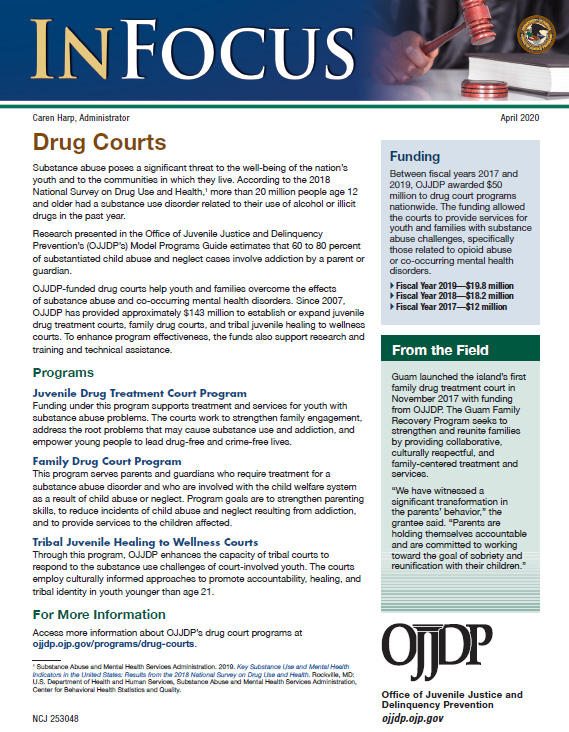 OJJDP's recently released Drug Courts fact sheet describes how OJJDP-supported drug courts are addressing substance abuse and its effect on youth and families.
OJJDP's recently released Drug Courts fact sheet describes how OJJDP-supported drug courts are addressing substance abuse and its effect on youth and families.Between fiscal years 2017 and 2019, OJJDP awarded $50 million to drug courts across the country through the following programs:
- Juvenile Drug Treatment Court Program. Juvenile drug courts are dockets within juvenile courts for cases involving youth with substance use disorders who need specialized treatment. These courts allow for intensive judicial supervision of youth that would not ordinarily be available in the traditional juvenile court process.
- Family Drug Court Program. Family drug courts serve parents who require substance abuse treatment and who are involved with the child welfare system because of child abuse, neglect, or other parenting issues. These courts work to improve the health, safety, and welfare of children and to support parents in their recovery through judicial oversight and access to individualized treatment services. The goal is to promote family reunification and stability.
- Tribal Juvenile Healing to Wellness Courts. As part of the Department of Justice’s Coordinated Tribal Assistance Solicitation, this initiative helps tribal courts respond to substance abuse in youth younger than age 21. Tribal juvenile healing to wellness courts increase community safety by holding youth accountable for delinquent behaviors while promoting recovery within a culturally supportive framework.
- Drug Treatment Courts Training and Technical Assistance Program. This initiative helps drug treatment courts increase their effectiveness through research-based services; consistent and efficient case planning, monitoring, and supervision procedures; and the use of performance measures to improve drug court case processing and service delivery.
Resources:
Read an Office of Justice Programs blog on how OJJDP-supported drug courts are adapting their practices during the COVID-19 epidemic to continue serving youth and families.
This issue of OJJDP News @ a Glance features an article about how OJJDP funding has helped the Rankin County, MS, Juvenile Drug Treatment Court improve data collection, use evidence-based treatment models, and more fully engage parents in the recovery process.
Read about how an OJJDP grant enabled the Judiciary of Guam to launch the island’s first family drug treatment court.
The OJJDP Model Programs Guide provides evaluations of juvenile and family drug court programs and a review of research on drug courts.
Access more information about OJJDP’s drug court programs on the Office’s website.
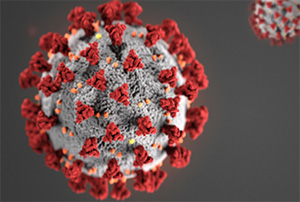 Graphic courtesy of the Centers for Disease Control and Prevention website.
Graphic courtesy of the Centers for Disease Control and Prevention website.The Office of Justice Programs (OJP) has released three blogs describing how OJJDP grantees are using innovative strategies to continue serving youth and families during the COVID-19 pandemic.
“Strengthening Connections: Mentoring Youth During a Pandemic” reports that OJJDP-supported MENTOR: The National Mentoring Partnership has developed tips and resources to help youth mentoring programs implement new approaches and continue operations during the pandemic. MENTOR is also working with iCouldBe, an e-mentoring platform, to expand and enhance virtual mentoring. iCouldBe is providing its platform free of charge to the mentoring field nationwide. A variety of corporate partners—including AT&T, Comcast, and Zoom—are donating resources to support information technology and Wi-Fi needs so as many youth as possible can stay connected in the face of social distancing requirements. In addition, some local chapters of Boys & Girls Clubs are acting as emergency childcare centers for essential workers. Big Brothers Big Sisters of America, another OJJDP grantee, is planning to launch a large-scale virtual mentoring curriculum called Mentoring 2.0.
“You Are Not Alone: Supporting Youth and Families Impacted by Substance Use During the COVID-19 Pandemic” highlights how OJJDP juvenile and family drug court grantees are adapting their practices to continue providing effective services during the public health crisis. The Rankin County, MS, court team has implemented in-home drug testing with parental supervision. On testing days, the staff text parents a reminder, and the parents text back the results. In addition, the team provided youth with a list of online mental health and addiction resources, free recovery and meditation apps, and local food resources. The Santa Clara County, CA, court team maintains contact with youth via phone and, where possible, mental health providers offer teletherapy. The Juvenile Probation Department no longer brings juveniles into custody for technical violations, and the county’s Young Women’s Freedom Center ensures clients have access to life coaches, computers, cell phones, and the Internet.
Another OJP blog released during Child Abuse Prevention Month, “Children’s Advocacy Centers: At the Forefront of the Fight Against Child Abuse,” discusses OJJDP-supported children’s advocacy centers (CACs), which coordinate the investigation, treatment, and prosecution of child abuse cases nationwide. The blog details the mission of the National Children’s Advocacy Center—a model for more than 1,000 CACs nationwide—and the CACs’ response to the pandemic. CACs dramatically increased their use of technology, with many multidisciplinary teams conducting their meetings via online platforms, and aggressively implemented teletherapy services to meet the mental health needs of children and families. National Children's Alliance, the national association and accrediting body for CACs, has developed a resource page to help children’s advocacy centers respond to the needs of children and families during the current public health crisis.
On April 1, 2020, the Department of Justice announced $850 million in OJP funding to assist states, communities, and tribes in their response to the coronavirus. The Coronavirus Emergency Supplemental Funding Program will provide funding to help eligible states, units of local government, and tribes prevent, prepare for, and respond to the coronavirus. The Bureau of Justice Assistance, one of six program offices within OJP, manages the program.
Federal COVID-19 Resources:
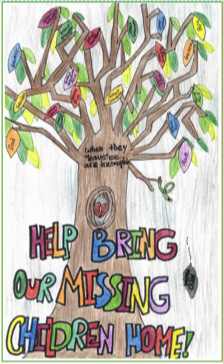 Elliana Conrad's winning poster will inspire the logo and artwork for National Missing Children's Day next year.
Elliana Conrad's winning poster will inspire the logo and artwork for National Missing Children's Day next year.President Ronald Reagan proclaimed May 25, 1983, as the first National Missing Children’s Day in memory of 6-year-old Etan Patz, who disappeared while walking to his bus stop in lower Manhattan on May 25, 1979. National Missing Children’s Day honors his memory as well as those children still missing.
Every May, the Department of Justice (DOJ) has observed National Missing Children’s Day with a ceremony that recognizes significant contributions by law enforcement and private citizens to protect children from harm. On account of the COVID-19 pandemic, this year’s in-person ceremony was canceled. OJJDP has created a special National Missing Children’s Day microsite on the OJJDP website to mark the occasion. The microsite features detailed information about the 2020 National Missing Children’s Day awardees and statements from the Attorney General as well as leaders of the Office of Justice Programs, OJJDP, and the National Center for Missing & Exploited Children. In addition, the site provides access to OJJDP and OJJDP-supported reports, tools, and training resources.
Following are summaries of the National Missing Children’s Day awards and this year’s award recipients:
The Attorney General’s Special Commendation recognizes the extraordinary efforts of an Internet Crimes Against Children (ICAC) task force, an affiliate agency, or an individual assigned to an ICAC task force or affiliate agency—for making a significant investigative or program contribution to the ICAC Task Force program. This year’s award recipients are Wisconsin ICAC Task Force Commander Matthew Joy and Special Agent in Charge Jesse Crowe, ICAC Supervisor for the Western District of Wisconsin. In 2019, these individuals played a central role in the recovery of a 14-year-old girl who had been transported across state lines by a suspected child molester with whom she had been chatting online. The perpetrator is now serving a sentence of 11 years and 3 months in federal prison.
The Missing Children's Citizen Award recognizes the extraordinary efforts of private citizens for their unselfish acts to safely recover missing or abducted children. This year’s award recipient is JoAnn Donovan of Punta Gorda, FL, a school bus driver for special needs students. When a 15-year-old girl with autism living in foster care did not board the school bus one day in May 2019, Ms. Donovan provided information to police officers that led to the arrest of her biological mother. The mother pled no contest to kidnapping, interference with custody, and removing a minor from the state. She will spend 2 years in jail.
The Missing Children's Law Enforcement Award recognizes the extraordinary efforts of law enforcement officers who have made a significant investigative or program contribution to the safety of children. This year’s award recipient is Senior Inspector Gerald Dysart of the U.S. Marshals Service in New Orleans, LA. Mr. Dysart provided the expertise and guidance that, over several months, forged Operation Empty Nest in April 2019. The Atlanta, GA, operation recovered missing children who were victims of sex trafficking, exploitation, and sexual and physical abuse. In addition, Mr. Dysart played a central role in the creation of the U.S. Marshals Service’s Missing Child Unit.
The Missing Children's Child Protection Award recognizes the extraordinary efforts of law enforcement officers who have made a significant investigative or program contribution to protecting children from abuse or victimization. This year’s award recipients are detectives Chastity Burke, Dennis Miller, Keith Earney, Jason Turner, Ruben Escobar, and Eugene Mefford of the Child Protection Unit at the Volusia County Sheriff's Office in Daytona Beach, FL. In May 2019, the six detectives brought a pedophile to justice and rescued two child victims within 6 hours of executing an emergency search warrant.
Each year, OJJDP invites fifth graders to participate in the National Missing Children's Day poster contest. The contest creates an opportunity for schools, law enforcement, and child advocates to discuss child safety strategies with youth, parents, and guardians. Elliana Conrad from Antonia Crater Elementary School in Newberg, OR, accepted the 2020 National Missing Children's Day Poster Contest Award.
Resources:
Read the Office of Justice Programs blog commemorating National Missing Children’s Day.
Access child abduction resources and information about the OJJDP-supported Internet Crimes Against Children Task Force program, the National Center for Missing & Exploited Children, and the AMBER Alert program.
Learn about the AMBER Alert Training and Technical Assistance Program’s new investigative checklists to help tribal law enforcement respond effectively to cases of missing and abducted children.
Access the National Criminal Justice Training Center’s selection of recorded webinars on endangered, missing, and abducted children.
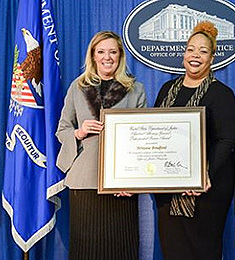 In December 2019, Dr. TeNeane Bradford (right) received the Assistant Attorney General’s Award for her work overseeing OJJDP's Title II Formula Grants program. Deputy Assistant Attorney General Katharine T. Sullivan is shown on the left.
In December 2019, Dr. TeNeane Bradford (right) received the Assistant Attorney General’s Award for her work overseeing OJJDP's Title II Formula Grants program. Deputy Assistant Attorney General Katharine T. Sullivan is shown on the left.Dr. TeNeane Bradford and her staff in OJJDP’s State Relations and Assistance Division support states and territories in implementing OJJDP’s Title II Formula Grants program. The program helps states reduce and prevent delinquency, improve their juvenile justice systems, and comply with the core requirements of the Juvenile Justice and Delinquency Prevention Act.
The core requirements call for states to deinstitutionalize status offenders, separate juveniles from adult inmates in secure facilities, remove juveniles from adult jails and lockups, and address racial and ethnic disparities. In fiscal year 2019, the Office awarded more than $37.6 million in formula grants.
As part of its oversight of the Formula Grants program, Dr. Bradford’s division conducts site visits and compliance audits as well as annual administrative reviews to determine whether states are eligible to receive formula grant funds and the amount for which they are eligible, based on their compliance with the core requirements. The division also provides technical assistance and sponsors and facilitates trainings to help states maintain eligibility and achieve full compliance with the core requirements.
Dr. Bradford also manages OJJDP’s Nonparticipating States program, which provides funds to nonprofit organizations and local governments in states that have chosen not to participate or that have been found ineligible to participate in the Formula Grants program. She also oversees several other grant programs designed to help state systems improve their operational effectiveness across various parts of their juvenile justice systems.
—Dr. TeNeane Bradford, Associate Administrator
As part of OJJDP’s commitment to improving the juvenile justice system, Dr. Bradford and her staff, in collaboration with the Council of Juvenile Justice Administrators, organize trainings for superintendents, directors, and administrators of state and local secure juvenile justice facilities.
Before joining OJJDP in 2017, Dr. Bradford served as senior supervisory policy analyst, acting assistant director of grants administration, and lead grant monitoring specialist in the Department of Justice’s Office of Community Oriented Policing Services. Dr. Bradford previously worked as the state reentry director/intensive supervision state coordinator at the South Carolina Department of Juvenile Justice.
Dr. Bradford earned a bachelor’s degree in religious studies from the University of South Carolina, master’s degrees in management and human resource development from Webster University, and a doctorate in public service leadership with an emphasis on criminal justice from Capella University.
By Youth Court Administrator Paul Bowen and Drug/Intervention Court Coordinator Katie Mitchell
Our court focuses on young people ages 14 to 17 with substance use disorders who have committed nonviolent delinquent offenses. The goal is to intervene before substance use leads to serious criminal behavior. Our program includes court appearances, regular drug tests, meetings with a probation officer, substance abuse treatment, and the engagement of families in the recovery process. In all of our work, we strive to adhere to a framework of best practices developed by OJJDP in partnership with a research team, experts in the field, and other federal agencies.
In 2016, the National Council of Juvenile and Family Court Judges (NCJFCJ) selected our court to participate in the OJJDP-funded Juvenile Drug Court Learning Collaborative. The project provides training, ongoing coaching, and evaluation to improve juvenile drug treatment court programs. A fiscal year 2018 OJJDP grant also helped us improve service delivery and programming.
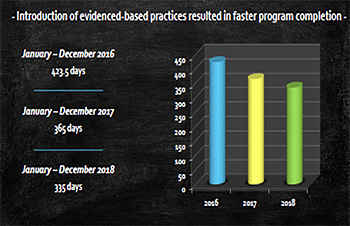 Between 2016 and 2018, the average length of time for program completion at the Rankin County Juvenile Drug Treatment Court dropped from 423.5 days to 335 days.
Between 2016 and 2018, the average length of time for program completion at the Rankin County Juvenile Drug Treatment Court dropped from 423.5 days to 335 days.We attribute this progress to a number of factors, including improved data collection, evidence-based substance abuse treatment, and family engagement.
We now collect data across a range of domains, including the number of days kids are in the program, the ratio of incentives to sanctions, the number of days in detention, graduation rates, and recidivism rates. We also break down the data by gender and race. Once we began collecting data, we realized our program was not achieving the outcomes we wanted. For example, the program was originally designed for 12 months, but the data showed that kids were in the program for much longer. This deep dive into the data offered proof for the team that change was needed along with a way to track our progress on an ongoing basis.
We have worked closely with Region 8 Mental Health Center, our outpatient treatment provider, to ensure the use of evidence-based treatment models. We were able to use grant funding to pay for the training of Region 8 counselors in evidence-based treatment models. The models we’re using now include Seeking Safety, which is specifically designed for clients with substance abuse and posttraumatic stress disorders. Another model we use is the Adolescent Community Reinforcement Approach, which aims to increase a family’s educational, vocational, and social supports. It used to be that the court and the treatment provider operated in different lanes. But the two lanes have merged somewhat. Now there is close coordination and collaboration. We used to meet only once a year; now we meet quarterly with the Region 8 administrators to discuss staff and training needs, grant requirements, and other matters.
Engaging parents in the drug treatment court program is essential to positive outcomes. We use the Parent Project model, a series of classes designed to reduce family conflict and juvenile crime, in addition to improving school attendance and performance. The program identifies ways to address family conflict, poor school performance, teen drug use, and many other issues. The class empowers many parents to handle challenging adolescent behaviors on their own. Before they begin the class, parents may feel isolated, but after the first class they realize they are not alone in their problems. Many parents continue meeting with other members of the class on an informal basis because they find peer support helpful.
Finally, we have effective and engaged judicial leadership. Judge Thomas Broome encouraged us to jump in and embrace the NCJFCJ Learning Collaborative, and he is our biggest cheerleader. If you don’t have strong leadership and someone pushing from the top, it is difficult for change to happen. Judge Broome is hands on with the kids and knows them all by name.
We get messages from our graduates saying that their experience in juvenile drug treatment court changed their lives. They say how important it was to have someone believe in them and motivate them. Those messages are a special inspiration to all of us on the court team.
Resources:
Read an Office of Justice Programs blog on how the court team in Rankin County and other OJJDP grantees are adapting their practices during the COVID-19 epidemic to continue supporting youth on the road to recovery.
The OJJDP Model Programs Guide provides evaluations of juvenile and family drug court programs and a review of research on drug courts.
Access more information about OJJDP’s drug court programs on the Office’s website.
_______________________Points of view or opinions expressed in this article are those of the authors and do not necessarily represent the official position or policies of the U.S. Department of Justice.
 Miguel Garcia is a youth member of California’s state advisory group and a policy coordinator at the Anti-Recidivism Coalition in Los Angeles. Photo is courtesy of Impact Justice.
Miguel Garcia is a youth member of California’s state advisory group and a policy coordinator at the Anti-Recidivism Coalition in Los Angeles. Photo is courtesy of Impact Justice. As a youth member of California’s state advisory group, Miguel provides input on the allocation of OJJDP Title II formula grant funds to juvenile justice and delinquency prevention programs in the state. He is employed as a policy coordinator at the Anti-Recidivism Coalition in Los Angeles, a group that provides a support network and access to housing, jobs, and educational opportunities for people reentering their communities from secure confinement. The organization also involves young people and their families in advocating for improvements to the juvenile justice system.
In addition, Miguel is a member of the Youth Advisory Council for the Annie E. Casey Foundation’s Juvenile Justice Strategy Group and a consultant to Northwestern University, where he informs the development of new resources for transition-age youth.
He also trains young adults in the AmeriCorps program to serve as reentry “navigators” for people transitioning from corrections back into the community. In an April 2020 interview, Miguel stressed the importance of informing youth about California’s “honorable discharge” option, which seals their records and reduces barriers to education and employment once youth have successfully completed community supervision. This option became available with the passage of California Senate Bill 625 in 2017.
“This legislation made a difference in my own life,” Miguel said. “It’s now possible for me to become a practicing attorney in California.” Miguel plans to go to law school and continue his work in public policy and juvenile justice reform. In 2018, Miguel earned a bachelor’s degree in political science and international affairs from the University of California at Riverside. He also holds three associate degrees from Riverside Community College.
—Miguel Garcia
It has been a long and difficult road to this promising future. Miguel grew up in a rough area of Riverside County. His parents were divorced, and his father was not a consistent presence in his life. “The community was always in conflict,” Miguel said. “Many people were unemployed. You come into contact with youth who are either trying to rob someone or involved in gangs. You’re having to choose between surviving or not surviving.” As a teenager, he began hanging out with the wrong crowd, and in 2010 he was incarcerated on serious charges.
When he entered confinement, he underwent surgery for a broken clavicle, and inadequate medical supervision led to a serious infection. Later, he was involved in a violent disturbance that landed him in lockdown for several weeks. “I was let out for 1 hour a day. All I remember is my white shirt, my trunks, and the white bed sheet.” In addition, he worried about the burden that monthly court fees were placing on his mother. “If she did not pay,” he said, “she would have lost her driver’s license and been arrested. My mother used her savings. Many communities of color don’t have savings, and that’s not possible for them.”
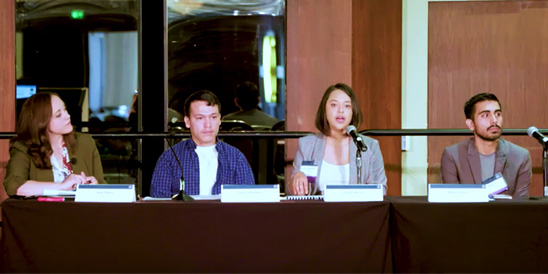 Miguel Garcia (shown on the right) participated in a youth panel discussion at OJJDP’s 2019 National Training Conference in Kansas City, MO.
Miguel Garcia (shown on the right) participated in a youth panel discussion at OJJDP’s 2019 National Training Conference in Kansas City, MO. Miguel’s life turned around when he joined an Alpha class for young men. Mentors taught leadership and communications skills and inspired him to begin planning a productive future. “Rosalinda [Rosalinda Vint, President of Women of Substance & Men of Honor] talked about formerly incarcerated young people out there doing fantastic things,” Miguel said. “I asked myself: How can I be part of that? I started to think about what my own dreams were, and what I could do to make them a reality.”
He began taking online college courses, joined vocational training programs, and worked on an inmate construction crew. The guard in charge of the construction project noticed Miguel’s performance, and asked him to supervise the 25 youth on the crew. “All of this positive information was reported by the parole agency, and it helped me get released,” Miguel said. “I went home with $5,000 I had earned for my work.”
After his release, Miguel lived with his uncle, away from his old neighborhood and its negative influences. While this was an improvement, he did not have access to reliable public transportation, and trips to his classes at Riverside Community College could take as long as 4 hours. The probation agency provided little information about community-based services or guidance in finding a job. Eventually, through his friendship with Ms. Vint and another mentor he met through the Alpha class, Miguel landed an internship with Jose Medina, a member of the California State Assembly. “That was my first real job when I came home. Everything kind of snowballed from there.”
To this day, Miguel is still in touch with many of his Alpha classmates. “They are my best friends,” he said. “They’ve all gone on to live fruitful lives.”
Many agencies and organizations are in the process of rescheduling in-person training and technical assistance events in response to the COVID-19 pandemic. Please check their websites for updated information.
 National Council of Juvenile and Family Court Judges 83rd Annual Virtual Conference: July 19–22, 2020
National Council of Juvenile and Family Court Judges 83rd Annual Virtual Conference: July 19–22, 2020
The 83rd annual virtual conference of the National Council of Juvenile and Family Court Judges will feature presentations on issues facing the juvenile and family court systems. It will include training tracks on family law, juvenile justice, child welfare, and family violence. There will also be tracks featuring practical and innovative solutions. Registration information is available online.
Psychology of School Threat Assessments: September 21–22, 2020
 Presented by the National Criminal Justice Training Center, this training examines the psychological and behavioral aspects of threat assessment and management. The training, to be held in Franklin, TN, will explore normal versus abnormal child and adolescent behaviors, strategies for identifying red flags, and how threats can be managed along a pathway toward violence (both short and long term) to ensure safety. Attendees will learn multidisciplinary threat assessment and management strategies and explore risk and protective factors for youth violence. Registration information is available online.
Presented by the National Criminal Justice Training Center, this training examines the psychological and behavioral aspects of threat assessment and management. The training, to be held in Franklin, TN, will explore normal versus abnormal child and adolescent behaviors, strategies for identifying red flags, and how threats can be managed along a pathway toward violence (both short and long term) to ensure safety. Attendees will learn multidisciplinary threat assessment and management strategies and explore risk and protective factors for youth violence. Registration information is available online.
The training will also be offered October 5–6 in Chandler, AZ, and November 4–5 in Reno, NV.
Conducting Child Abuse Investigations: July 27–31, 2020
To be held in St. Louis, MO, this no-cost training will offer the latest information on the investigation and prosecution of child abuse cases using a multidisciplinary team approach. Attendees will learn about medical evidence, techniques for interviewing child victims/witnesses as well as adult suspects/witnesses, and legal issues and considerations in child physical and sexual abuse cases. The training is offered by the National Criminal Justice Training Center. Registration information is available online.
The training will also be held September 28–October 2 in Tampa, FL.
Sexual Offenses: Mind and Motivation: August 3–4, 2020
This training, to be held in Appleton, WI, will offer an introduction into the mindset of those who commit sexually motivated crimes. Attendees will learn about sex offender typologies and patterns of behavior. The training will explore the relationship between paraphilia (e.g., exhibitionism, voyeurism, and fetishism) and criminal acts. Participants will discuss actual case examples to gain insight into offenders’ methods. The training is offered by the National Criminal Justice Training Center. Registration information is available online.
The training will also be held September 16–17 in Mansfield, MA, and October 26–27 in Valhalla, NY.First Responder Roles in Missing and Abducted Child Cases: August 11, 2020
This no-cost training provides policy, procedural, and operational information to support swift, decisive, and effective action when incidents of missing or abducted children occur. The training is designed for call takers, first responders, investigators, law enforcement, law enforcement support, tribes, and tribal partners. The event, presented by the National Criminal Justice Training Center, will be held in Prescott Valley, AZ. The registration deadline is July 8. Registration information is available online.Conducting Unexplained Child Death Investigations: August 24–27, 2020
To be held in Phoenix, AZ, this no-cost training will discuss statistics, causes, and risk factors in cases involving child deaths. The training, presented by the National Criminal Justice Training Center, will also focus on legal issues and considerations, the medical response to pediatric emergencies, investigator roles and responsibilities in cooperation with the medical examiner, the initial response to a child death and protection of the death scene to avoid contamination of evidence, and digital evidence. Registration information is available online.
Multidisciplinary Team Response to Child Sex Trafficking: August 31–September 3, 2020
This no-cost training, offered by the National Criminal Justice Training Center, will improve multidisciplinary team (MDT) responses to child sex trafficking cases and help those who want to establish a formal MDT in their community to effectively respond to child sex trafficking. Subject matter experts will work with teams to identify gaps and develop short- and long-term response plans. The training will be held in Memphis, TN. Registration information is available online.
The training will also take place November 16–19 in Denver, CO.
Criminal Connections: Child Pornography and Child Sexual Abuse: September 14–15, 2020
Presented by the National Criminal Justice Training Center, this training will explore investigative strategies that address the relationship between child sexual abuse and child pornography to supplement an investigation and corroborate victim statements. In addition, participants will learn about the most effective tools and resources to investigate sexual abuse cases and produce the most comprehensive case outcomes. The training will be held in Mansfield, MA. Registration information is available online.
The training will also be held January 25–26, 2021, in Little Rock, AR.
Psychology of School Threat Assessments: September 21–22, 2020
Presented by the National Criminal Justice Training Center, this training examines the psychological and behavioral aspects of threat assessment and management. The training, to be held in Franklin, TN, will explore normal versus abnormal child and adolescent behaviors, strategies for identifying red flags, and how threats can be managed along a pathway toward violence (both short and long term) to ensure safety. Attendees will learn multidisciplinary threat assessment and management strategies and explore risk and protective factors for youth violence. Registration information is available online.
The training will also be offered October 5–6 in Chandler, AZ.
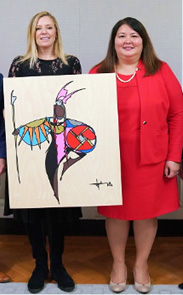 Shown above are (l.) Principal Deputy Assistant Attorney General Katharine T. Sullivan, the task force’s co-chair designee for Attorney General William Barr, and (r.) Assistant Secretary for Indian Affairs Tara Sweeney, co-chair designee for Secretary of the Interior David Bernhardt.
Shown above are (l.) Principal Deputy Assistant Attorney General Katharine T. Sullivan, the task force’s co-chair designee for Attorney General William Barr, and (r.) Assistant Secretary for Indian Affairs Tara Sweeney, co-chair designee for Secretary of the Interior David Bernhardt.
Photo courtesy of the Operation Lady Justice website.
Presidential Task Force Conducts Listening Sessions on Missing and Murdered American Indians and Alaska Natives
In late May and early June 2020, the President’s Task Force on Missing and Murdered American Indians and Alaska Natives conducted four listening sessions with tribal governments to address the high rates of missing and murdered people in Indian country—particularly missing and murdered women and girls.
The task force, designated Operation Lady Justice, is consulting with tribal leaders to develop and strengthen investigative protocols to resolve new and unsolved cases, improve information and data sharing, establish best practices for communicating with families throughout an investigation, and raise public awareness through outreach to affected communities.
“The American Indian and Alaska Native people . . . experience domestic violence, homicide, sexual assault, and abuse far more frequently than other groups,” said President Trump in his proclamation of May 5, 2020, as National Missing and Murdered American Indians and Alaska Natives Awareness Day. “These horrific acts, committed predominantly against women and girls, are egregious and unconscionable. [W]e reaffirm our commitment to ending the disturbing violence against these Americans and to honoring those whose lives have been shattered and lost.”
OJJDP To Hold Tribal Consultation
On June 25, 2020, OJJDP will hold a tribal consultation to discuss how the Office can most effectively collaborate with tribes to implement applicable provisions of the Juvenile Justice Reform Act (JJRA) of 2018. The JJRA reauthorized and substantially amended the Juvenile Justice and Delinquency Prevention Act.
The JJRA amendments created specific provisions related to tribes regarding funding transparency, tribal representation in state advisory groups, and Title II Formula Grants funding. The consultation will focus on how OJJDP can best support tribes in carrying out provisions that affect tribal youth. The Office also will seek to learn more about tribes’ evolving training and technical assistance needs as well as the barriers tribes encounter in accessing federal grants.
AMBER Alert Tools Launched To Help Tribal Law Enforcement Respond to Missing Children
 The AMBER Alert Training and Technical Assistance Program, in collaboration with the National Center for Missing & Exploited Children and the Bureau of Indian Affairs’ Office of Justice Services, has developed a set of investigative checklists to help tribal law enforcement respond effectively to cases of missing and abducted children. The checklists are available in web, PDF, and mobile (Android and Apple) formats.
The AMBER Alert Training and Technical Assistance Program, in collaboration with the National Center for Missing & Exploited Children and the Bureau of Indian Affairs’ Office of Justice Services, has developed a set of investigative checklists to help tribal law enforcement respond effectively to cases of missing and abducted children. The checklists are available in web, PDF, and mobile (Android and Apple) formats.
The Patrol First Responder Checklist provides information to promote an accurate and timely response by first-responding officers to reports of missing and abducted children. The actions taken during the initial response have a profound impact on the outcome of investigations.
The Investigative Officer Checklist presents important considerations for obtaining information and transitioning the incident from patrol first responders. The checklist includes specific techniques for handling nonfamily abductions, family abductions, and runaways.
The Supervisory Officer Checklist guides oversight and decisionmaking to promote adequate information collection and immediate mobilization of investigative resources.
Additional Video Recordings From OJJDP Training Conference Available
At OJJDP’s National Training Conference in September 2019, approximately 200 participants engaged in interactive discussions, panels, and workshops to enhance implementation of OJJDP’s Title II Formula Grants program and support compliance with the core requirements of the Juvenile Justice and Delinquency Prevention Act. The conference was organized by the Office’s State Relations and Assistance Division.
OJJDP has made available video recordings of conference sessions and interviews with participants on the Office’s State Relations and Assistance Division National Training Conference webpage. The following recordings were recently added to the webpage:
- Effective Monitoring Systems: An OJJDP Compliance Monitor explains the Juvenile Justice Reform Act mandate that states must have an “effective” system of monitoring compliance with the core requirements of the Juvenile Justice and Delinquency Prevention Act. States were previously required to have an “adequate” monitoring system.
- Juvenile Justice Resources: A representative from the Department of Health and Human Services’ Family and Youth Services Bureau highlights relevant resources for stakeholders.
- Partner Resources and Cross-System Collaboration: Officials from the Department of Education (DOE) discuss the objectives of The Prevention and Intervention Programs for Children and Youth Who Are Neglected, Delinquent or At Risk (Title I, Part D of the Every Student Succeeds Act); opportunities for collaboration between justice and education professionals; and the DOE resources.
- Tribal Youth Leadership: A representative from the OJJDP-supported United National Indian Tribal Youth, Inc. (UNITY) discusses the organization’s work to empower tribal youth.
- Engaging Tribal Entities: A representative from Oklahoma’s Office of Juvenile Affairs highlights the ways in which tribes can use Title II funding from OJJDP to improve outcomes for youth.
- Needs of U.S. Territories: The U.S. Virgin Islands’ state advisory group vice chair discusses the territory’s juvenile justice and delinquency needs.
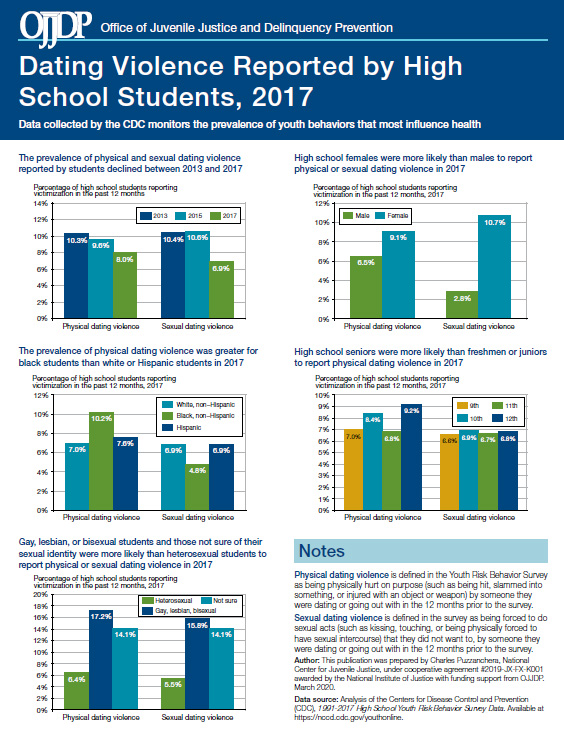
Data Snapshot on Teen Dating Violence Released
A new Data Snapshot draws on data from the Centers for Disease Control and Prevention's Youth Risk Behavior Surveillance System to document the trends and characteristics of dating violence reported by high school students. Following are some highlights:
- The prevalence of physical and sexual dating violence reported by students declined between 2013 and 2017.
- The prevalence of physical dating violence was greater for black students than white or Hispanic students in 2017.
- Gay, lesbian, or bisexual students and those not sure of their sexual identity were more likely than heterosexual students to report physical or sexual dating violence in 2017.
Access the full list of Data Snapshots on OJJDP’s Statistical Briefing Book website.
Two Practices Rated “Effective” by CrimeSolutions.gov
 CrimeSolutions.gov—a National Institute of Justice resource that informs practitioners and policymakers about what works, what doesn't, and what's promising—has rated Brief Alcohol Interventions for Adolescents and Young Adults as “effective” in reducing alcohol consumption and alcohol-related problem outcomes for adolescents and young adults. These interventions motivate and provide resources to help participants moderate their drinking through a short-term intervention (one to five sessions) and seek more intensive treatment in the long term, if needed. They include at least one of the following components: a discussion of alcohol consumption, feedback on risk or levels of alcohol use, comparisons with local or national norms, information on potential harms, coping strategies, and goal-setting plans for dealing with drinking situations.
CrimeSolutions.gov—a National Institute of Justice resource that informs practitioners and policymakers about what works, what doesn't, and what's promising—has rated Brief Alcohol Interventions for Adolescents and Young Adults as “effective” in reducing alcohol consumption and alcohol-related problem outcomes for adolescents and young adults. These interventions motivate and provide resources to help participants moderate their drinking through a short-term intervention (one to five sessions) and seek more intensive treatment in the long term, if needed. They include at least one of the following components: a discussion of alcohol consumption, feedback on risk or levels of alcohol use, comparisons with local or national norms, information on potential harms, coping strategies, and goal-setting plans for dealing with drinking situations.
In addition, CrimeSolutions.gov has rated Expressive Writing Interventions for Adolescents as “effective” for improving adolescents’ problem behaviors, internalizing behaviors, and school participation. The practice is rated “no effects” for school performance. This brief psychosocial intervention, also known as “written emotional disclosure,” is designed to improve emotional expression and processing during adaptation to stressful situations. The goal is to improve psychological and physical health.
Report Published on Tip Lines Used To Identify School Safety Threats
A report funded by the National Institute of Justice presents the methodology and findings of a survey on tip lines for school safety. Tip lines are structured systems that enable students, parents, school staff, or community members to report information on perceived potential threats to school safety.
The survey, which involved a nationally representative sample of 1,226 school principals, determined the prevalence of tip lines for school safety, the types of schools that are more likely to use tip lines, how tip lines are designed and implemented, the challenges of operating tip lines, and their perceived effectiveness.
The survey found that 51 percent of public middle and high schools currently have a tip line. More than half of tip lines are staffed or monitored 24 hours a day, 7 days a week; a staff member receives calls, texts, or other entries in real time. Most calls are anonymous. Principals perceive tip lines to be an effective school safety strategy; 50 percent report that tip lines have prevented violent incidents, and two-thirds believed tip lines enabled their schools to respond more effectively to bullying. Seventy-three percent of respondents reported that tip lines had prevented incidents of self-harm or suicide.
All OJJDP publications may be viewed and downloaded on the publications section of the OJJDP website. Print publications may be ordered online at the National Criminal Justice Reference Service website.

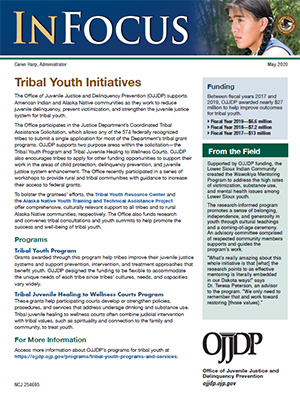 Tribal Youth Initiatives (In Focus Fact Sheet)
Tribal Youth Initiatives (In Focus Fact Sheet)
NCJ 254695
The fact sheet describes OJJDP’s support of American Indian and Alaska Native communities as they work to reduce juvenile delinquency, prevent victimization, and strengthen the juvenile justice system for tribal youth. Between fiscal years 2017 and 2019, OJJDP awarded nearly $27 million to help improve outcomes for tribal youth.
View and download this publication.

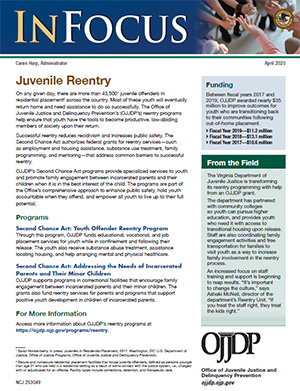 Juvenile Reentry (In Focus Fact Sheet)
Juvenile Reentry (In Focus Fact Sheet)
NCJ 253049
This fact sheet describes OJJDP programs that provide specialized services to youth who are transitioning back to their communities following out-of-home placement. It also provides an overview of OJJDP programs that promote family engagement between incarcerated parents and their children. Between fiscal years 2017 and 2019, OJJDP awarded nearly $35 million to juvenile reentry initiatives.
View and download this publication.
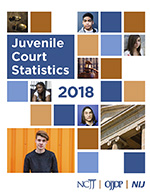
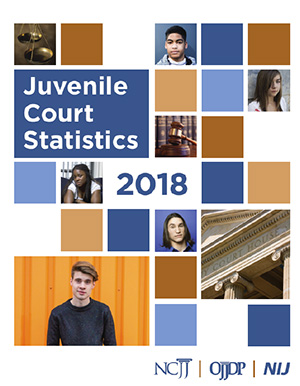 Juvenile Court Statistics 2018 (Report)
Juvenile Court Statistics 2018 (Report)
This OJJDP-sponsored report describes delinquency cases and petitioned status offense cases that courts with juvenile jurisdiction processed in 2018 and presents trends since 2005. In 2018, courts with juvenile jurisdiction handled an estimated 744,500 delinquency cases and an estimated 97,800 petitioned status offense cases.
View and download this publication.
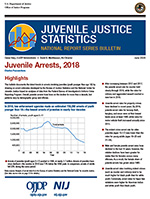
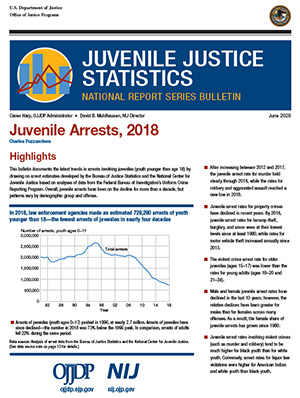 Juvenile Arrests, 2018 (Bulletin)
Juvenile Arrests, 2018 (Bulletin)
National Report Series
NCJ 254499
This bulletin summarizes recent trends in juvenile arrests in the United States based on data from the FBI’s Uniform Crime Reporting program. The cumulative data in this bulletin reveal recent and long-term shifts in juvenile arrests based on offense, gender, and race. The number of arrests involving juveniles in 2018 was at its lowest level since at least 1980, and much of the decline has occurred in the past 10 years. Between 2009 and 2018, the number of juvenile arrests fell 60 percent.
View and download this publication.
Coming Soon—
Juveniles in Residential Placement, 2017 (Bulletin)
OJJDP sponsors the Census of Juveniles in Residential Placement (CJRP) to gather comprehensive and detailed information about youth in residential placement because of law-violating behavior. This biennial survey details the characteristics of youth held for delinquency and status offenses in public and private residential facilities in every state. The most recent CJRP data show that the number of youth in placement continues to decline. Between 1997 and 2017, the overall number of youth in residential placement decreased 59 percent to 43,580, its lowest level since the data collection began in 1997.